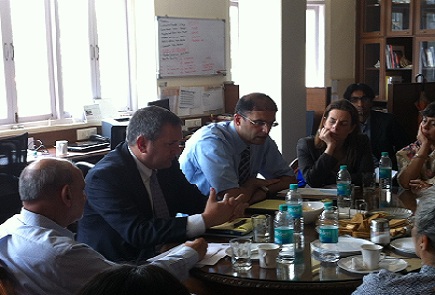
The Arab uprisings have been met with silence from a key player in the region: Israel. The regional order of balance centered on various issues – namely, Iran-Israel tensions, the Palestinian conflict and the Shia-Sunni sectarian divide – is changing due to varying interests in the region. Is a military confrontation between Israel and Iran forthcoming? What role will Israel play in the region after the Arab uprisings? Given India’s defence interests with Israel and its energy dependence on Arab nations, what should be India’s diplomatic approach in this fast-changing region?
Gateway House: Indian Council on Global Relations hosted an interactive discussion with distinguished Israeli officials Benjamin Krasna (Director of Political-Economic Research and Analysis, Ministry of Foreign Affairs [MFA], Israel) and Oren Anolik (Director of the Department for Non-Proliferation of Weapons of Mass Destruction, MFA, Israel). Ambassador Rajendra Abhyankar (former Indian Ambassador to Syria, Turkey, Azerbaijan and the EU) and Gateway House’s Ambassador Neelam Deo moderated the discussion on Israel’s role in West Asia.
The discussion focused on Israel’s response to the on-going violence in Syria, which grows increasingly important due to the contiguous boundary Israel shares with Syria. Whatever the outcome of the conflict, India too will be affected as Syria borders many of India’s important partners – apart from Israel, in the north with Turkey, with Iraq in the east and Jordan to the south.
